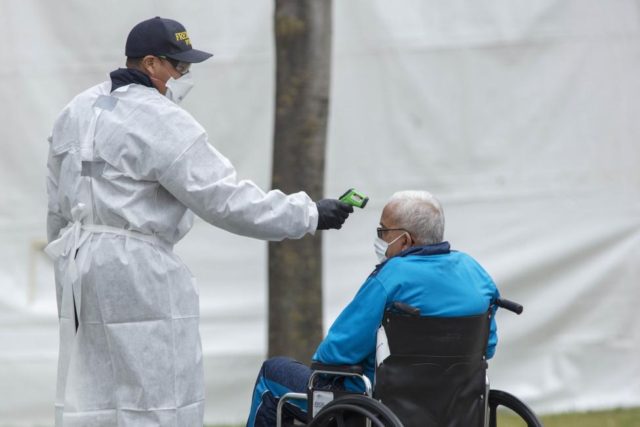May 26 (UPI) — A genetic mutation linked to dementia might increase a person’s risk for serious illness from COVID-19, a study published Tuesday in the Journal of Gerontology said.
The findings are the latest to report a possible association between genetics and risk of poor prognosis with the disease caused by the new coronavirus, SARS-CoV-2.
The elderly and those with underlying health conditions, including dementia, already are at greater risk for severe disease and death from the virus, experts have said.
“Several studies have now shown that people with dementia are at high risk of developing severe COVID-19,” co-author David Melzer said in a statement. “This study suggests that this high risk may not simply be due to the effects of dementia, advancing age or frailty or exposure to the virus in care homes.”
Melzer, who is a professor of epidemiology and public health at the University of Exeter in England, added, “The effect could be partly due to this underlying genetic change, which puts them at risk for both COVID-19 and dementia.”
Residents of assisted-living and nursing home facilities have accounted for roughly half of the nearly 100,000 deaths from COVID-19 in the United States, according to an analysis conducted by the Kaiser Family Foundation.
Although not all residents of these facilities suffer from dementia, approximately half do, based on estimates from the Alzheimer’s Association.
Melzer and researchers at the University of Connecticut School of Medicine, analyzed data from the U.K. Biobank, a database of health information on 500,000 volunteers between age 48 and 86.
The researchers focused on people of European ancestry who have the ApoE gene, a variant of which, called “e4,” is known to increase the risk for dementia.
They found that 9,022 of almost 383,000 people with European ancestry had two copies of the e4 variant, while another 223,000 had two copies of a variant called e3. Those with e4 have a 14-fold higher risk for dementia than those with e3, they noted.
The team then looked at positive tests for Covid-19 between March 16 and April 26, when testing for the coronavirus was carried out largely in hospitals, suggesting the cases were severe.
Among those who tested positive for COVID-19 between those dates, 37 had two copies of the e4 variant of ApoE, while 401 had two copies of the e3 variant.
After researchers took into account various factors, including age and sex, they found that those with two e4 variants had more than double the risk of severe COVID-19 than those with two e3 variants.
“This is an exciting result because we might now be able to pinpoint how this faulty gene causes vulnerability to COVID-19,” study co-author Chia-Ling Kuo, a senior biostatistician the University of Connecticut School of Medicine, said in a statement.
“This could lead to new ideas for treatments,” she said. “It’s also important because it shows again that increasing disease risks that appear inevitable with aging might actually be due to specific biological differences, which could help us understand why some people stay active to age 100 and beyond, while others become disabled and die in their 60s.”

COMMENTS
Please let us know if you're having issues with commenting.